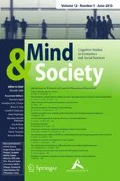An inescapable factor affecting decision-making at all levels, including the strictly individual one, fear is increasingly called upon to explain individual and governmental choices, all the more so in the times of the global crisis and the European debt impasse. Still, on one side, downplaying the importance of systemic risk and radical uncertainty in financial markets, mainstream economics clearly failed both to evaluate the possibility of crisis and, above all, to cope adequately with its effects.
But fear is more than lack of trust and its relevance, in economic terms, cannot be limited to the negative side of Keynes’s ‘animal spirits’. In a way, it is the evolution of economics itself—from the classics and their focusing on wealth and its allocation, to the marginal revolution and the transformation of economics into a broad dimension, rather than a circumscribed part of human activities, to Keynes and the attention he posed on uncertainty, to behavioral economics, aiming at explaining consumption and financial decisions by the use, among others, of emotional factors—that makes it possible, and actually compels to speculate about fear in the realm of economics.
This symposium collects a first series of essays dealing with the role of fear in decision making and the effect this emotion plays or should play. A second set of papers and an overview of the issues and their analyses will appear in the next issue of Mind & Society. All of these papers came after a call for papers that we have launched in order to explore the relation between economics, economy, fear and public policies.
Author information
Authors and Affiliations
Corresponding author
Rights and permissions
About this article
Cite this article
Cedrini, M.A., Novarese, M. & Pope, R. Symposium on “Fear, economic behavior and public policies” - Part I. Mind Soc 13, 213–214 (2014). https://doi.org/10.1007/s11299-014-0157-5
Published:
Issue Date:
DOI: https://doi.org/10.1007/s11299-014-0157-5

